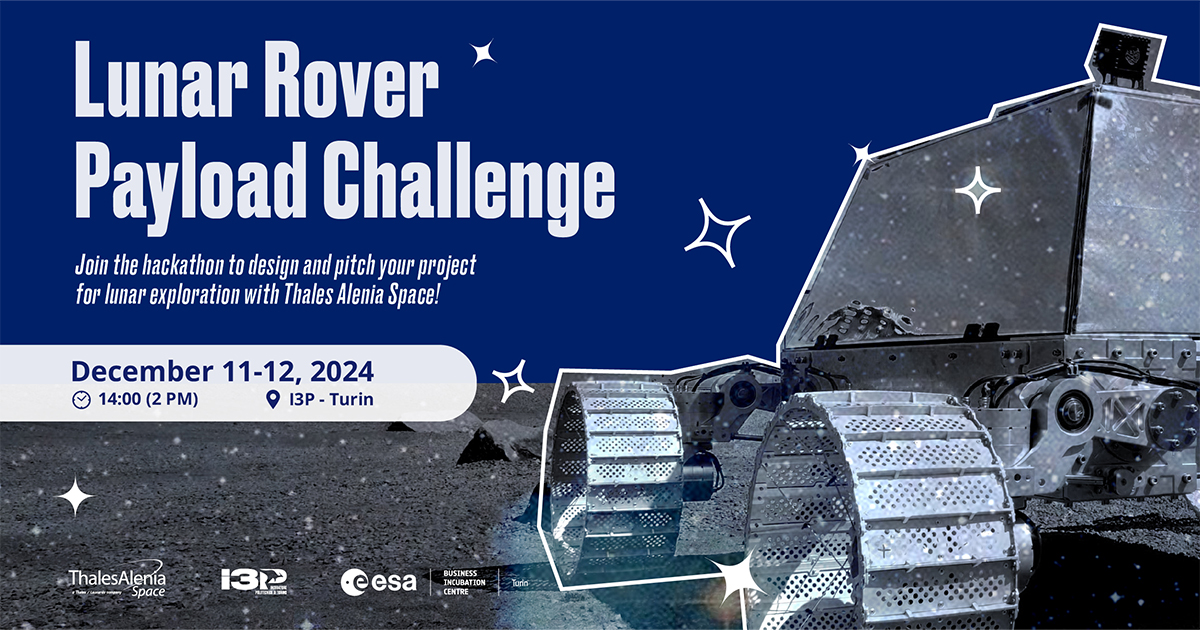
Following the success of the first phase of the European Space Agency’s program European Moon Rover System (EMRS) – for which Thales Alenia Space in Italy (TAS-I) prototyped and tested the first full-scale multipurpose lunar rover demonstrator – the time has now come for launching a world-first engineering challenge aimed at developing novel payloads that will be mounted and tested on the rover breadboard. In fact, with the upcoming dawn of lunar surface exploration and exploitation, rovers will need to host a wide variety of tools and instruments, from manipulators to regolith collectors and infrastructure-laying tools.
In collaboration with ESA BIC Turin, the incubation program for space start-ups run by I3P with the scientific and technological support of Politecnico di Torino and LINKS Foundation, Thales Alenia Space is proud to invite students and space exploration enthusiasts to join the Lunar Rover Payload Challenge!
On December 11 & 12 at I3P in Turin, Italy, this new exciting hackathon will give each participating team the opportunity to design and pitch a novel payload, which – if selected – will be actually manufactured, mounted and tested on the EMRS rover demonstrator, currently hosted and operated in the Rover Exploration facility (RoXY) in the Turin industrial plant of Thales Alenia Space.
The initiative will articulate into three distinct events, starting from December 2024 to the first half of 2025. The hackathon will be just the beginning of a fascinating adventure into the world of lunar exploration.
The first day of Wednesday, December 11 will start with a brief introduction from the TAS-I team about the content of the challenge and the European Moon Rover System programme. In addition, a few technical sessions will be held from TAS-I experts in the subjects of Space Robotics, Space and Lunar Exploration, System Engineering and much more: each session is aimed at providing useful elements to those seeking to excel in the challenge.
During the afternoon, the challenge will officially begin with the formation of the final teams and the delivery of the assignment. Each team will have 24 hours to conceptualize and design the prototype of their payload, which will be pitched in front of the jury at the end of the second day of the hackathon.
Useful skills to excel in the challenge include CAD modeling, mechanical design, rapid prototyping and microcontrollers; however, part of the judgment will take into account team dynamics, pertinence, innovativeness of the proposed solution and capacity to effectively present the idea to the jury, which will select two to three teams to move forward towards the prototyping and testing phases.
During the first quarter of 2025, the selected teams will be able to further develop their ideas with the support of TAS-I Robotics team; prototyping will be supported by TAS-I FabLab and RoXY laboratory. In the following weeks, the prototypes will be integrated and tested on EMRS rover: the full test campaign might take from 1 to 2 full days of activities. One winning team will be selected based on compliance to expected performances, robustness of the solution and quality of the prototype.
Teamwork and complementarity of skills will be essential to face the challenge. The hackathon is open to contributions from everyone, with no limitations related to educational background, occupation or geographical affiliation.
The event will be held from 14:00 (2 p.m.) on Wednesday, December 11, to 18:00 (6 p.m.) on Thursday, December 12, at the Agora Hall of the I3P incubator, located within the Campus of Politecnico di Torino and accessible from both the main gate at Corso Castelfidardo 30/A, and the pedestrian entrance at Via Borsellino 53/N in Turin, Italy.
To take part in the hackathon, it is necessary to register on Eventbrite. Before or during the event, participants will have to form a team of 3 to 5 people, in order to face the challenge as a group. Live presence is required, as it will not be possible to participate virtually. English will be the official language of the event.
Day 1: Wednesday, December 11, 2024
14:00 | Participants reception
14:30 | Introduction to the challenge
16:30 | Start of the hackathon!
20:00 | Dinner for the participants
21:00 | The hackathon goes on during the night
Day 2: Thursday, December 12, 2024
09:00 | Breakfast for the participants
09:30 | The hackathon goes on
13:00 | Lunch for the participants
15:30 | Project finalization phase
16:30 | Project submission deadline
16:45 | Project pitch of each team
17:45 | Announcement of the selected teams
18:00 | Event conclusion
Drawing on over 40 years of experience and a unique combination of skills, expertise and cultures, Thales Alenia Space delivers cost-effective solutions for telecommunications, navigation, Earth observation, environmental management, exploration, science and orbital infrastructures. Governments and private industry alike count on Thales Alenia Space to design and build satellite-based systems that provide anytime, anywhere connections and positioning, monitor our planet, enhance management of its resources and explore our Solar System and beyond.
Thales Alenia Space sees space as a new horizon, helping to build a better, more sustainable life on Earth. A joint venture between Thales (67%) and Leonardo (33%), Thales Alenia Space also teams up with Telespazio to form the parent companies' Space Alliance, which offers a complete range of services. Thales Alenia Space posted consolidated revenues of approximately €2.2 billion in 2023 and has around 8,600 employees in 8 countries, with 16 sites in Europe.
The site uses technical cookies, which are essential for the proper use of the site, and third-party analytical cookies, in order to improve site performance. If you accept or continue to browse the site, you consent to the use of cookies.


